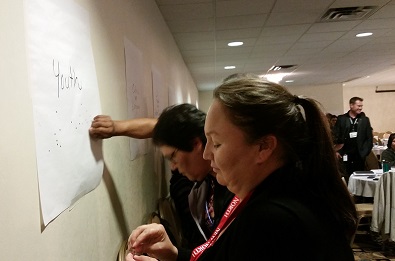People voted for their biggest priorities in northern Saskatchewan by putting one of 10 dots on different signs. Photo by Chelsea Laskowski
Planning for a regional strategy “for the north and by the north” is well underway after a meeting in Prince Albert this week.
More than 80 municipal leaders identified their priorities related to lobbying the federal government.
An academic crew led by U of S professor Ken Coates is facilitating the strategy planning, with the intention of fast-tracking the region’s priorities. The plan is to make the provincial and federal government aware of the most pressing needs for northern Saskatchewan while they “have a small window of opportunity” to put something together and get a favourable response, said New North’s Duane Favel. New North is the advocate group for northern municipalities.
Director Ken Coates points out northerners know best so even though he’s facilitating, what’s really moving things ahead are their votes and voices. The day-long meeting made use of a few different democratic processes that sped things along.
By mid-afternoon, the group of leaders had identified items like education, training, housing, business development, safety, and youth as their priorities. Coates, a researcher who has experience dealing with different levels of governments, said it’s best to narrow those priorities down if they want to see results.
These recent efforts aren’t the first time New North has been involved in strategic planning. About a decade ago, a northern action plan was scrapped.
During the Thursday meeting, one attendee who works with Opportunities North pointed out that actions like this have a history of “not crashing and burning but not going very far.”
Buffalo Narrows deputy mayor Jackie Derocher said the same ideas she heard on Thursday had been brought up a decade ago, but back then wasn’t the right time because the north hadn’t been ready to address those issues yet.
Now, Derocher said northerners are changing their approach, which gives her hope.
“Their set of mind is changing to that, instead of always complaining about the problem, now people are starting to step up and do something about it. So I’m really hoping now that we are going to see some action from this,” she said.
Derocher said the Truth and Reconciliation Commission, La Loche mass shooting, and the recent announcement that Buffalo Narrows Correctional Centre are extra fuel for northerners.
“How can we work with the federal government? How can we work with what we have? Because now is the time to dust ourselves off, pick ourselves up and to keep going. We cannot sit back anymore, and I really see that, I heard that today.”
The next step in the strategy is to get further approval from First Nations and Metis groups, then select a steering committee that will be in charge of sharing that strategy with the province and federal government.
That committee needs to focus on the north as a whole, Durocher said.
“For years, the government has sectioned us off into regions and then we fight against each other for what little money or opportunity there is. And now I think we really have a chance here to really work together and say I’m not only representing my community but I’m representing the whole north.”
There was a lot of discussion around who should be involved on the committee. The room decided that each region needs to be represented, and so did a mix of community leaders, researchers and different cultures.
The next steps is to get approval on the priorities from First Nations and Metis groups, and to put out a call for nominations related to the steering committee.
Representatives from FSIN, PAGC, the Metis Nation-Saskatchewan, the provincial NDP, and several different ministries were in attendance.
